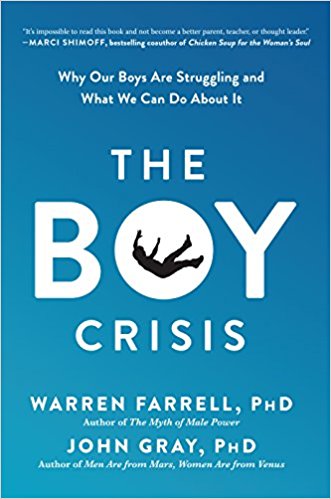Board of Advisors

Paul A. Blanchard is a strategic communications consultant in New York City, specializing in the explanation of complex technical issues to government officials, legislators, business executives, investors, and the American public. A native of Baton Rouge, Louisiana, he holds scientific degrees from Yale, Cambridge, and Harvard, and an MBA from MIT’s Sloan School of Management.

As both a business consultant and an empowerment coach, Deb Blum is an activator and a catalyst for change for families and organizations. Deb has two teen boys, is a podcast host for Parenting 3.0, moderates the official Boy Crisis Facebook Group, runs a large parent organization and serves as a strategic advisor to several companies and non-profits.

Chris Casillas dedicated a year to full-time inquiry asking the question “What’s the root cause of school shootings?” His quest led to an uncovering of the systemic dysfunction causing issues like the boys crisis and beyond. Chris now works on regenerative community building with an aim to orient cultures towards deeper connection and a greater capacity to serve the common good.

Robert Samery has been involved in social advocacy and education since 1998. He has been a leader of several organizations dealing with such diverse issues as organized national real estate boards, public education funding, family law and since 2013 Robert has focused on boys’ and men’s issues. Robert is a strong team builder.

Mark Sherman, PhD, is an emeritus professor of psychology at SUNY New Paltz, who has taught, researched, and written on gender topics for more than 40 years. For the last 25 his focus has been issues concerning boys and young men, and he has written extensively on this topic for his blog on Psychology Today. Dr. Sherman has three sons and five grandsons.
Contact
Contact WHCBM Steering Committee:
Coalition Chair: Dr. Warren Farrell - warren@warrenfarrell.com
Please Donate!
Your donations to the work of the Coalition to Create a White House Council on Boys and Men through PayPal and Network for Good are processed by our parent 501(c)(3) non-profit association, the Global Initiative for Boys and Men.
Paypal:
You can also become a Patron through Patreon.
Become a Patron!
Sign up for our newsletter, The Proposal.

A silent crisis in men’s health gets worse
Across the life span -- from infancy to the teen years, midlife and old age -- boys and men are more likely to die than girls and women
The Washington Post, April 17, 2023
A silent crisis in men’s health is shortening the life spans of fathers, husbands, brothers and sons.
For years, the conventional wisdom has been that a lack of sex-specific health research mainly hurts women and gender minorities. While those concerns are real, a closer look at longevity data tells a more complicated story.
Across the life span — from infancy to the teen years, midlife and old age — the risk of death at every age is higher for boys and men than for girls and women.
The result is a growing longevity gap between men and women. In the United States, life expectancy in 2021 was 79.1 years for women and 73.2 years for men. That 5.9-year difference is the largest gap in a quarter-century. (The data aren’t parsed to include differences among nonbinary and trans people.)
The longevity gap between men and women is a global phenomenon, although sex differences and data on the ages of greatest risk vary around the world and are influenced by cultural norms, record keeping and geopolitical factors such as war, climate change and poverty.
The Boy Crisis: Why Our Boys Are Struggling and What We Can Do About It.


WHAT IS THE BOY CRISIS?
It’s a crisis of education. Worldwide, boys are 50 percent less likely than girls to meet basic proficiency in reading, math, and science.
It’s a crisis of mental health. ADHD is on the rise. And as boys become young men, their suicide rates go from equal to girls to six times that of young women.
It’s a crisis of fathering. Boys are growing up with less-involved fathers and are more likely to drop out of school, drink, do drugs, become delinquent, and end up in prison.
It’s a crisis of purpose. Boys’ old sense of purpose—being a warrior, a leader, or a sole breadwinner—is fading. Many bright boys are experiencing a “purpose void,” feeling alienated, withdrawn, and addicted to immediate gratification.
So, what is The Boy Crisis? A comprehensive blueprint for what parents, teachers, and policymakers can do to help our sons become happier, healthier men and fathers and leaders worthy of our respect.

